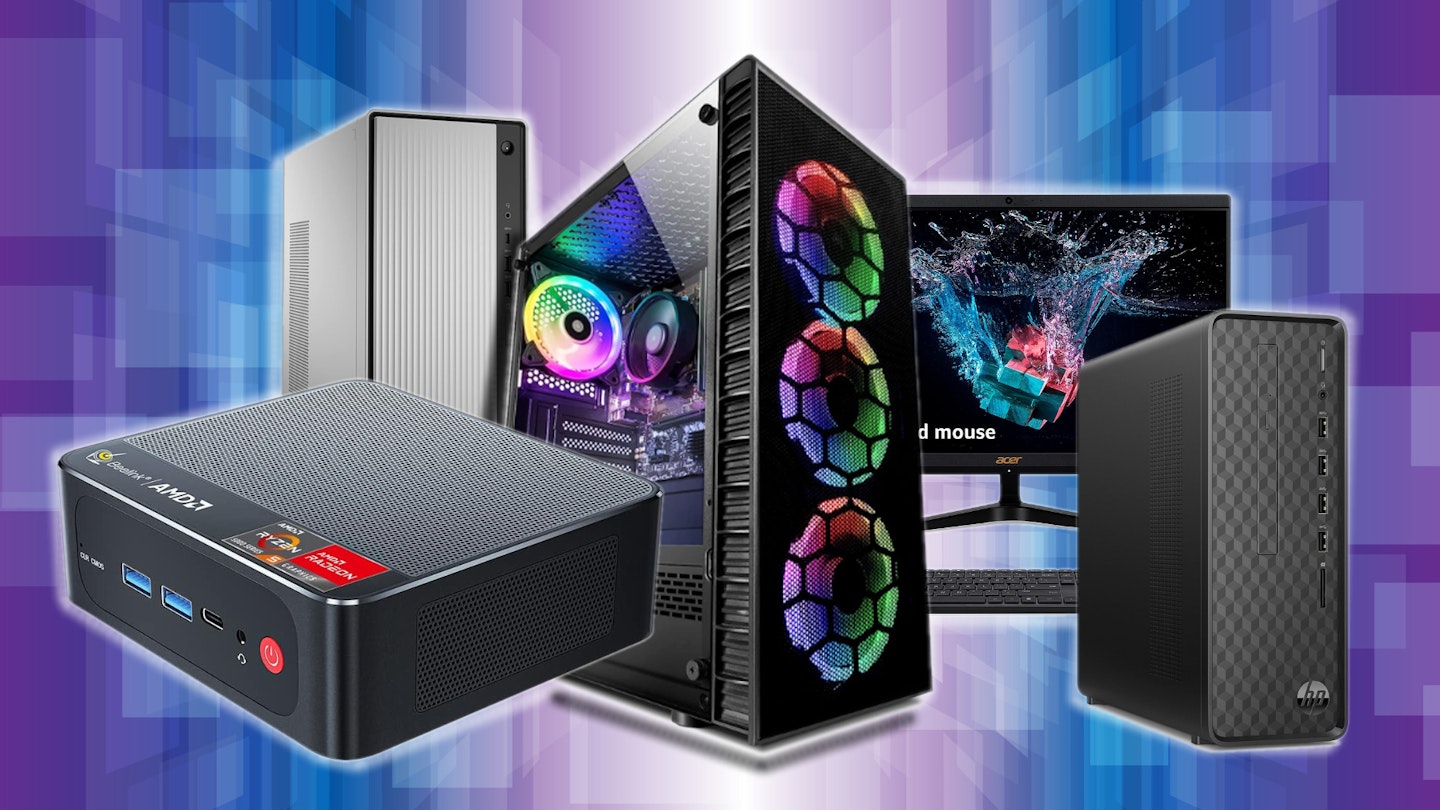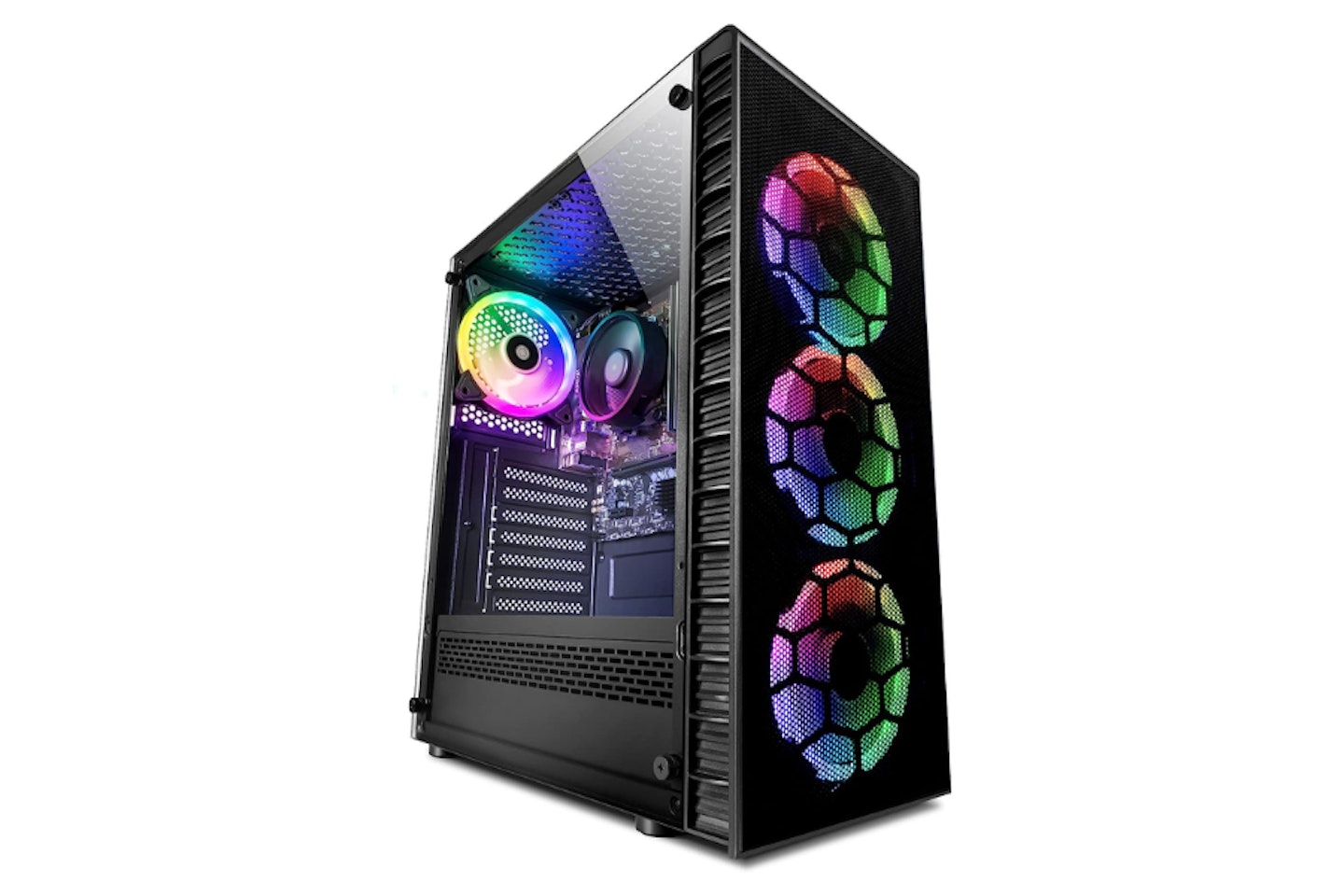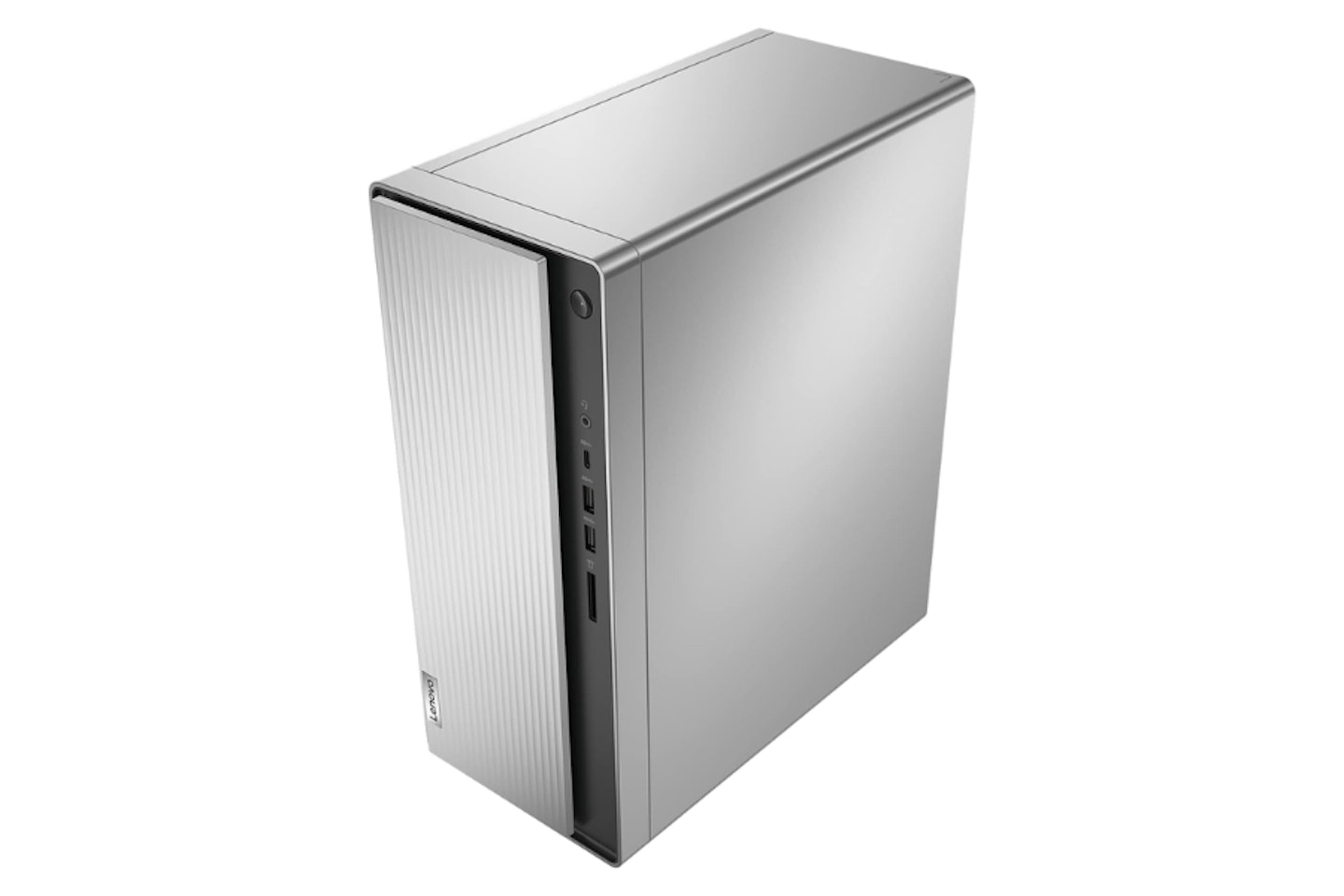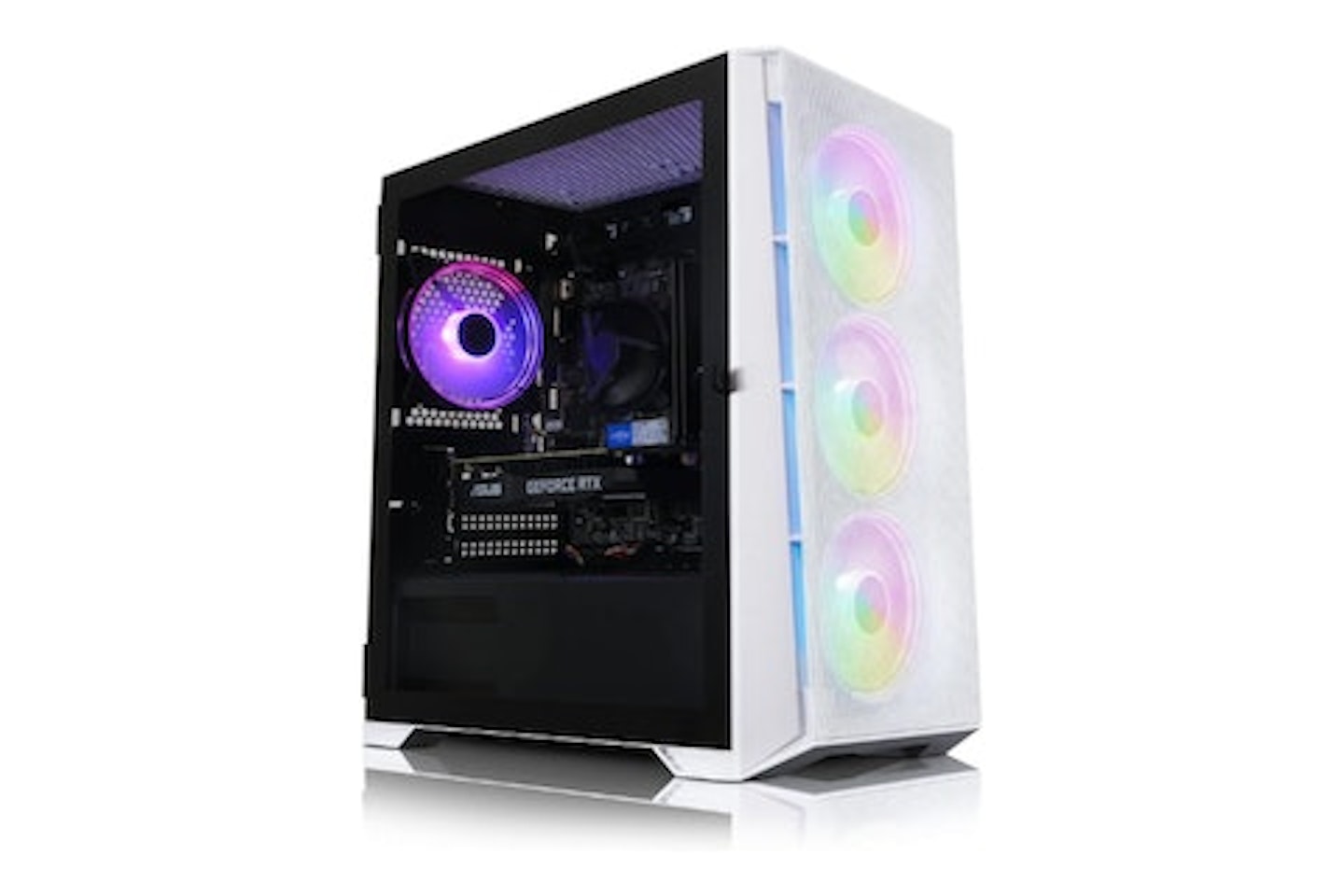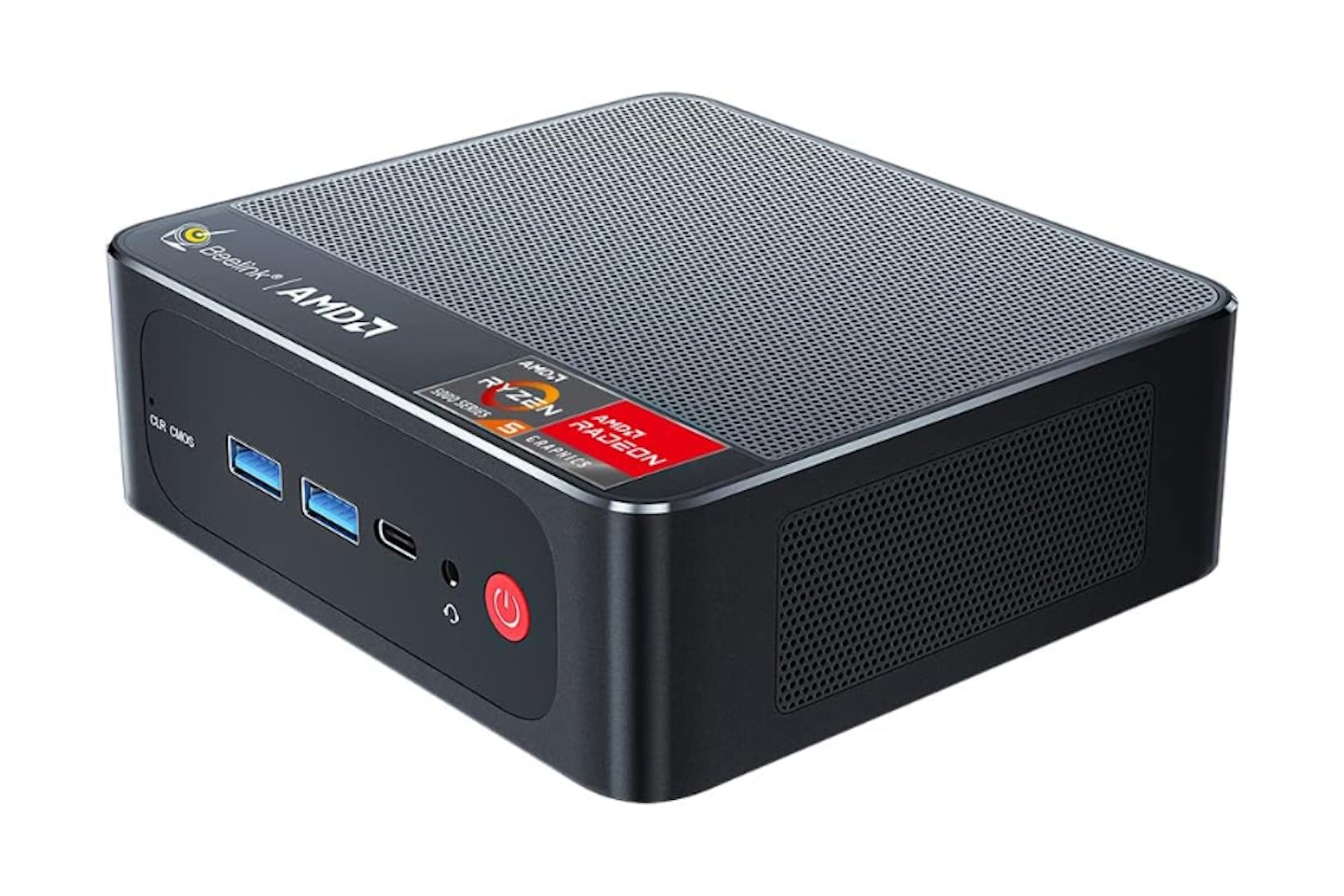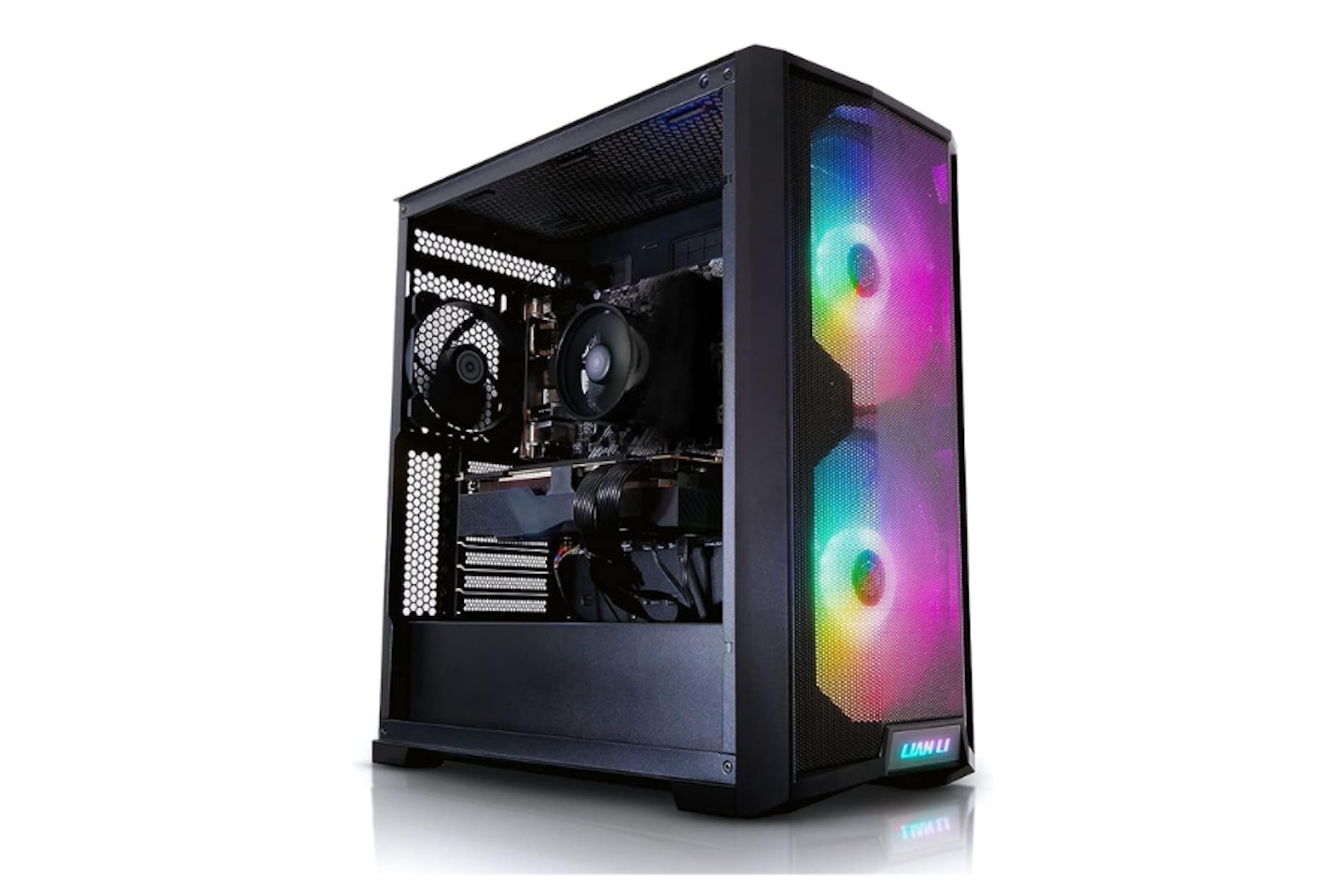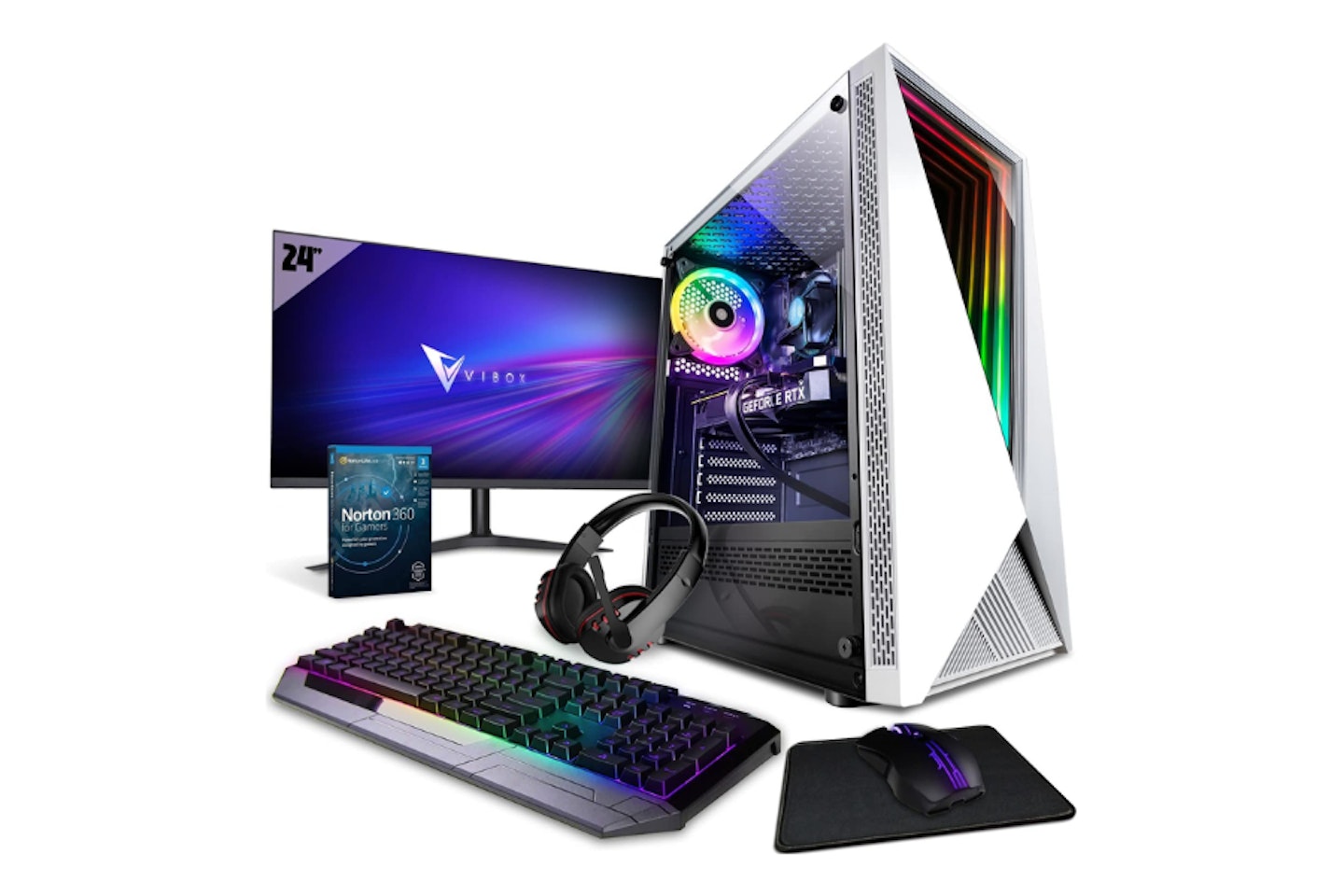As with all modern tech, even the best budget PCs can over-promise and under-deliver unless you know what to look for. But that's not limited to computers at the cheaper end of the spectrum - it's also true for the best PCs that money can buy.
However, manufacturers will cut different corners to ensure other components are up to scratch. It's all about balance. But which balance is right for you? A gamer on a budget will have different needs than someone who needs a home office PC. We're here to help you narrow things down and spend your money wisely.
Best budget PCs of 2025 at a glance
• Best overall budget PC: HP Slim S01-pF2012na Desktop PC - View at Currys
• Best value budget PC: Vibox I-7 Gaming PC - View at Amazon
• Best budget PC for students: Acer Aspire C24-1800 All-in-One PC - View at Currys
• Best budget PC for work: Lenovo IdeaCentre 5 Desktop PC - View at Amazon
The best budget PCs come in small cases, the size of a box folder, and huge towers covered in multicoloured lights. Plus, the specifications all differ, and so does the price. If you're a media professional looking for a basic video editing PC, you'll need plenty of RAM, CPU and graphics power. But if you're a student or a casual browser, you'll need a well-balanced spec for office apps, browsing and videos - perhaps even a space-saving all-in-one PC.
Thankfully, we've rounded up a variety of the best budget PCs, including computers for all uses. We've also included a buyer's guide and explained some computing jargon at the end of the article. So, let's look at some of the best computers money can buy - minus the eye-watering price tag.
Please note: All prices are correct at the time of writing. Prices, stock and deals are subject to change without notice.
Best budget PCs of 2025
Best overall budget PC
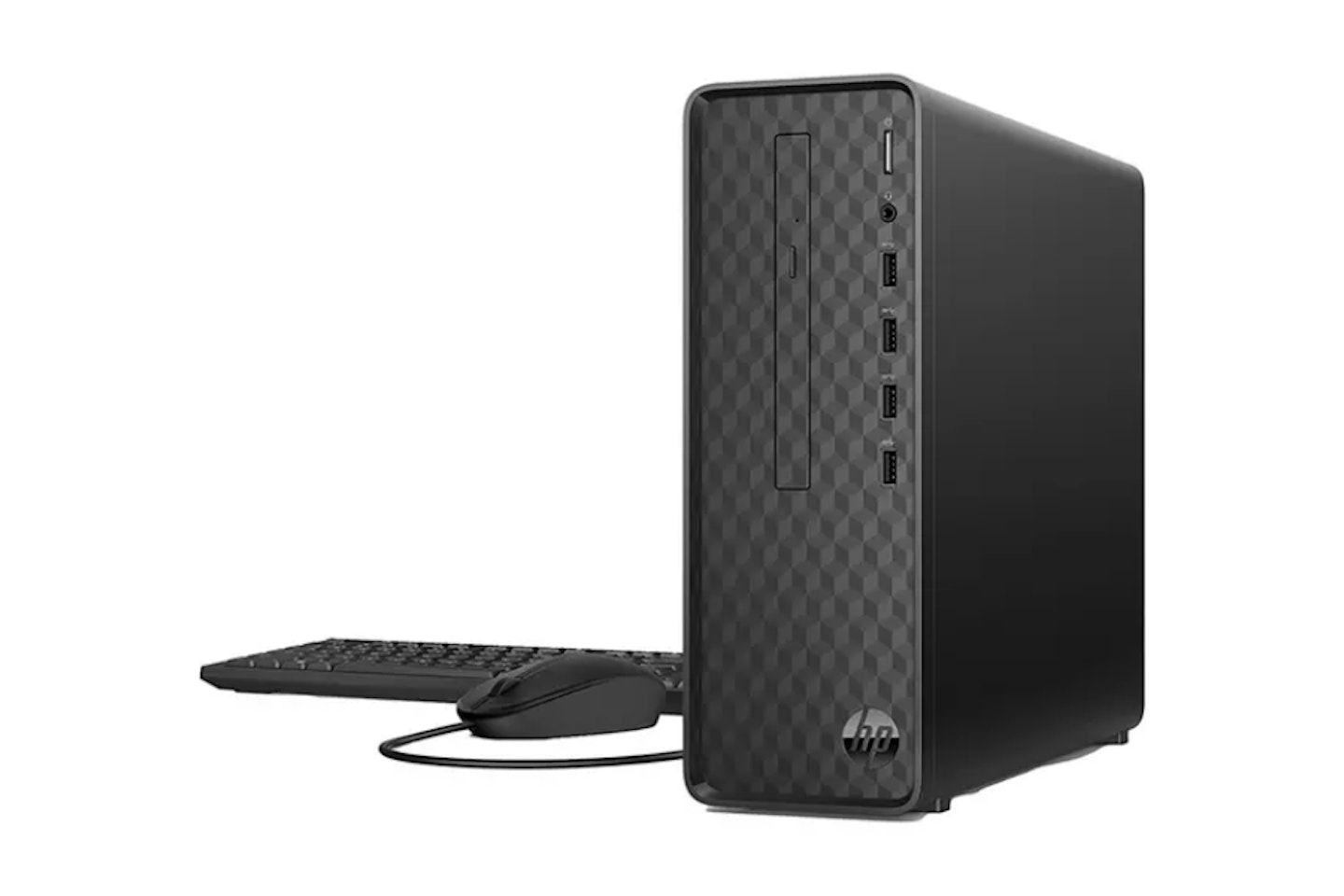
www.currys.co.uk
HP's signature cube-covered isometric textured design is just one aspect that makes this PC shine as a super-affordable yet high-value PC option. The company's S01 slim desktop is aptly named, with a small form factor that will sit happily anywhere. Thankfully, despite the smaller case, there are plenty of USB ports, an SD card reader, and a DVD drive. That's right - this will read your CDs and DVDs - an increasingly rare feature in many modern PCs.
Hardware-wise, you have a modest 128GB of SSD storage - but we're glad to see that this can be expanded via the SD card slot. Processor power comes courtesy of the Intel Pentium J5040, but once again, the Intel UHD 605 integrated graphics is probably not for gamers. 4GB of RAM is equally a starter-level specification which you'll want to upgrade. That said, this is the winner of our best budget PC category, so those concessions are to be expected. What you're getting here is a solid but basic PC from a well-respected brand.
Pros
- Great space-saving design
- Excellent value
- Solid hardware for easy browsing
Cons
- Small storage - Buy an external drive
| CPU | Intel® Core™ i3-12100 Processor |
| GPU | Intel UHD Graphics 730 - integrated |
| RAM | 8GB |
| Storage | 256GB SSD |
| Dimensions | 270 x 95 x 303 mm |
| Weight | 3.02 kg |
- Customer review: "Set up without problems and has worked perfectly since purchase about a month ago."
Best value budget PC
Yes, this is marketed as a gaming PC, but that doesn't mean you must game on it to enjoy the stunning specifications. Not only do you have a respectably capable Quad Core Ryzen processor, but also a huge 16GB of RAM.
Souping up the spec even more is the 1TB SSD - so you can expect a decent amount of storage and lightning-fast boot and application load times. The onboard graphics are okay enough, but anyone wanting a slick gaming experience will most likely opt to upgrade this with a dedicated card. That said, this machine will cope extremely well with everything else. Add Windows 11 Home and a decent keyboard and mouse, and you have one of the best starter-budget PCs we've seen. As long as you're fine with a slightly gamer-oriented case design, this Vibox I-7 Gaming PC is hard to beat as an all-around budget performer.
Pros
- 1TB SSD for fast loading
- Huge 16GB RAM
- Windows 11
- Very good value and upgradeable
Cons
- WiFi is an external adapter
| CPU | Quad Core AMD Ryzen 3200G |
| GPU | Radeon Vega 8 |
| RAM | 16GB |
| Storage | 1TB SSD |
| Dimensions | 18.8 x 38.2 x 39.3 cm |
| Weight | 12 Kg |
- Customer review: "I am not a games enthusiast, so I can't really comment on this aspect of its performance. For optimum video performance, I installed a Radeon RX6400 I bought some time ago, which was an easy upgrade, and the display is really sharp and clear. I would advise gamers to install a dedicated graphics card when they can, although the onboard graphics are fine. I think this PC is amazing value though. A Windows 11 license alone would cost over £100 if you had to buy it."
Best budget PC for students
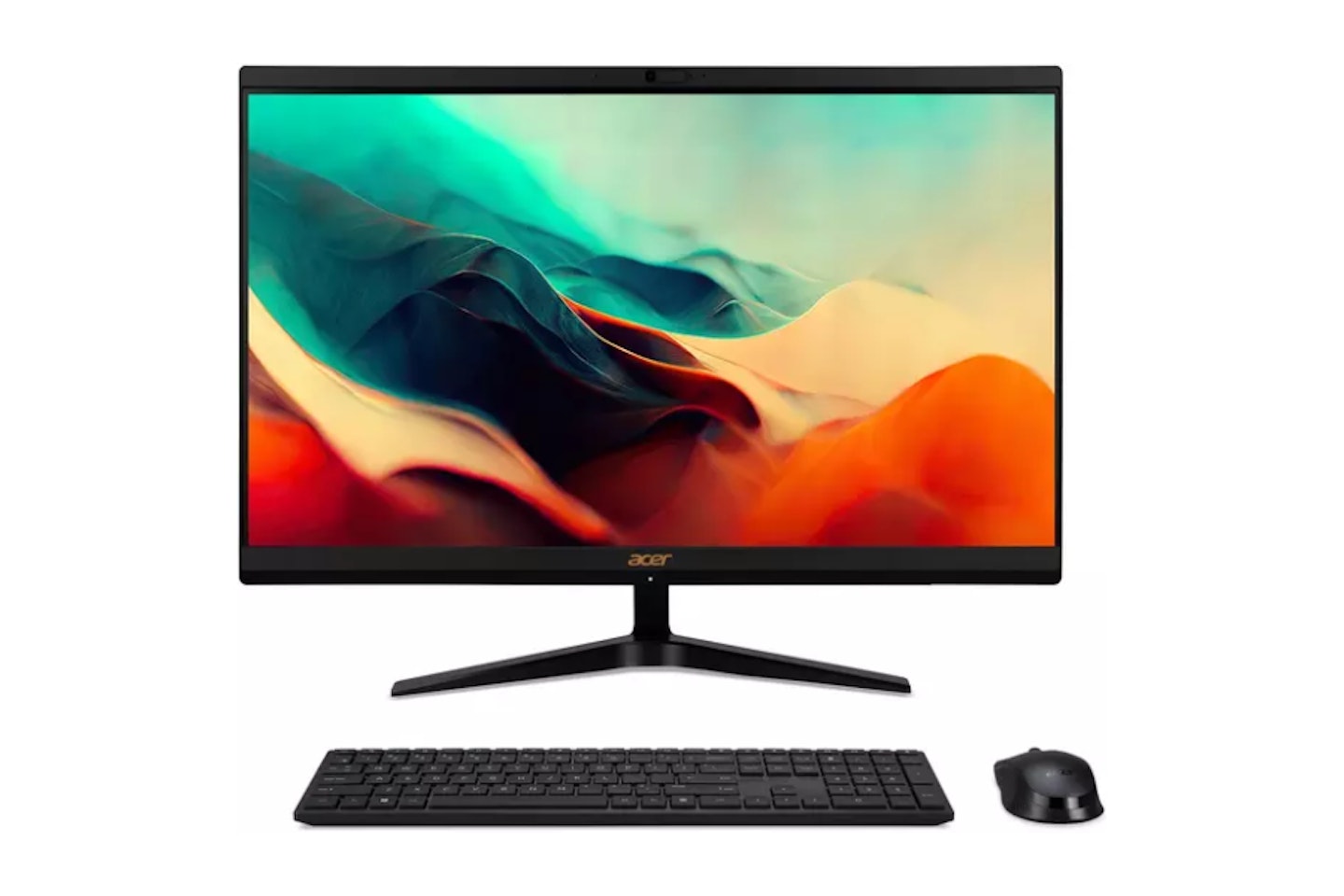
www.currys.co.uk
If there's one thing that students are short of, other than cash, it's space. Halls of residence and student lodgings tend to be on the cramped side. That's where this Acer Aspire C24-1800 comes in. It's an all-in-one PC with a generous 23.8-inch display that houses the PC itself. Despite the slim case, this does indeed pack a healthy 8GB of RAM, and an Intel Core i3 and a 512GB SSD. So, more than enough power for typical student applications and browsing.
Some extras really do make this PC stand out, such as the built-in 5-megapixel webcam - ideal for any tutoring over Teams or Zoom. Clutter is even more minimised by the wireless keyboard and mouse and the inclusion of internal stereo speakers. Lastly, for those long hours of study, the screen is an IPS panel with an anti-blue light feature - so you'll be able to avoid tired eyes and burn the midnight oil when you need to.
Pros
- The all-in-one ultra-slim design includes a built-in webcam and Acer Visioncare to protect your eyes
- Includes a wireless keyboard and speakers
- Built-in speakers
Cons
- Not easily upgradeable
| CPU | Intel Core i3-1235U |
| GPU | Integrated |
| RAM | 8GB |
| Storage | 512GB SSD |
| Dimensions | 405.2 x 540.4 x 37.3 mm |
| Weight | 5.1 kg |
- Customer review: "I wanted something easier to work on while doing preparation for presentations using my normal laptop. This desktop has provided exactly what I need, is quick (compared to my older laptop), easy to see and set-up. Very happy.."
Best budget PC for business
Lenovo is another brand that has carved out a niche for affordable but solidly built budget PCs. Businesses need reliability and simplicity when it comes to running office applications, and this IdeaCentre 5 has a focused build that concentrates power where you need it.
Firstly, the Ryzen 7 CPU and 8BG of RAM are going to run some games - but remember the graphics card in a low-end integrated one, so don't expect top gaming performance here. But it is more than enough for Microsoft 365 and everyday business tasks. Secondly, you have more ports than many of the others on this list - essential for connecting to multiple screens, printers and other office peripherals. Although it only comes with Windows 10 right now, this is far from a show-stopper as the latest Windows 11 still reportedly has some teething issues that can affect some applications. So, we think this is a safe and solid choice for any businessperson looking to stay productive on a budget.
Pros
- Will run essential office applications with ease thanks to decent RAM and i7 CPU
- Small and neat with a professional finish - won't hog your desk space
- Easily upgradable later if you want, for instance, add RAM
Cons
- Windows 10 Home OS isn't the latest (but will still run what you need)
| CPU | AMD Ryzen 7 5700G |
| GPU | AMD integrated |
| RAM | 8GB |
| Storage | 512 GB SDD |
| Dimensions | 53.2 x 40 x 24.3 cm |
| Weight | 5.65 kg |
- Customer review: For the price and specs you can't go wrong, the machine is quick and quiet. I would suggest adding another 8GB of RAM, about £30, as this will make it even better. Can run Windows 11 too. Gaming wise it's okay - its not going to run very high-end stuff at high frame rates, but then not much would without a dedicated graphics card."
Best budget PC for gaming
ADMI is fast making a name for itself regarding budget gaming PCs. This Gaming PC with a Ryzen 5500 CPU also packs a more than respectable 16GB of RAM. But the star of this show is the fantastic NVIDIA RTX 3050 GPU. It might not be the very latest generation of cards from Nvidia, but it comes close.
And let's not forget that stunning white mesh case and RGB fans, allowing plenty of airflow to keep things cool. Connection-wise, you are spoiled for choice - with around eight USB ports. For the price, this PC is near perfection. Being a tower case, you can start your pro gamer career knowing you can upgrade later. The 1TB SSD is fine - but you'll definitely need more space if you have a lot of games, but that's easily solved with an external SSD. All in all, hard to beat for the price.
Pros
- Modern, stylish case with plenty of ventilation
- A fantastic GPU
- A good amount of RAM
Cons
- Fairly small storage, upgrading for larger projects may be required
- RGB lighting aesthetic isn't for everyone
| CPU | AMD Ryzen 5500 |
| GPU | NVIDIA RTX 3050 8GB |
| RAM | 16 GB |
| Storage | 1TB NVME SSD |
| Dimensions | 61.7 x 49.29 x 40.9 cm |
| Weight | 10.5 kg |
- Customer review: "Very happy with the PC, runs as expected and runs my favourite game (Warhammer Darktide) very well. Decent value for a pre-built, as it comes out only a little more expensive than building one yourself - and if time is money, then this is definitely a good deal."
Best budget PC in a small case
Good things really do come in small packages, and Beelink set out to prove it with its AMD Ryzen7 5800H machine. This kind of PC is often called a mini PC and was designed to sit quietly in places like living rooms, often out of sight, to run media centres for streaming videos and so on. That said, many use these as small form-factor gaming machines and straightforward desktop PCs as they appeal to those who like tidier setups.
Unbelievably, this is packing a full Ryzen7 CPU with a monstrous 32GB of RAM. Add to that the 1TB SSD, and you have something of a mini powerhouse on your hands. Despite only having an integrated AMD graphics card, any gamer can up the spec here with an external GPU if needed. But, for the rest of us, this is going to eat whatever you throw at it for breakfast.
Pros
- Small yet powerful
- Excellent CPU
- Ideal media PC for living rooms
- Huge RAM and SSD capacity
- Good connectivity for such a small case
Cons
- Not as upgradeable as larger cases
| CPU | AMD Ryzen7 5800H |
| GPU | AMD integrated |
| RAM | 32GB RAM |
| Storage | 1T NVMe SSD |
| Dimensions | 185 x 138 x 119 mm |
| Weight | 1.63 kg |
- Customer review: "Exactly what you need for a media PC. Sits very comfortably underneath my TV (not on the next shelf but right under it, it's that small). Plenty powerful enough to do the things I need it to do (general computing, media playing and browsing 95% of the time)."
Best budget PC that balances spec with cost
We realise everyone has a different figure in mind regarding the term 'budget' - but here we're balancing cost and spec. This ADMI PC is one of the best budget options that gives the biggest bang for your buck compared to most. There's power right where you need it at just the right level to keep the price tag nicely under the £1k mark. If you thought you'd need to be spending upwards of £1500-£2000, this is the budget powerhouse you've been looking for.
With an RTX 4060 graphics card- the star performer here - you could use this for video editing, image creation or gaming. That said, you do still have 16GB of RAM, a Ryzen 5 CPU and a 1TB SSD - perfect for any task. The case is even a Lian Li model - although not the prettiest of its line-up - but a Lian Li it is. Stunning value and balanced performance.
Pros
- Brilliantly balanced spec which doesn't cut the wrong corners, retaining sheer performance
- RTX 4060 GPU for the latest and greatest gaming experiences
- 16 GB of RAM is a nice surprise - we were expecting 8GB for this price.
Cons
- The case is well-engineered, but a little outdated style-wise
| CPU | AMD Ryzen 5700X 4.6Ghz Turbo Eight Core |
| GPU | NVIDIA RTX 4060 |
| RAM | 16GB |
| Storage | 1TB SSD |
| Dimensions | 60.8 x 56.8 x 50 cm |
| Weight | 15.8 Kg |
- Customer review: "In terms of gaming I have yet to find a game that will make this beast struggle most games don't even seem to have an effect on the GPU at all, sometimes not even enough to warrant its fans to spin. The CPU is good enough that you won't run into any performance issues or thermal throttling. As of yet, I've had zero problems with it at all. Overall great PC in my opinion."
Best upgradable budget PC
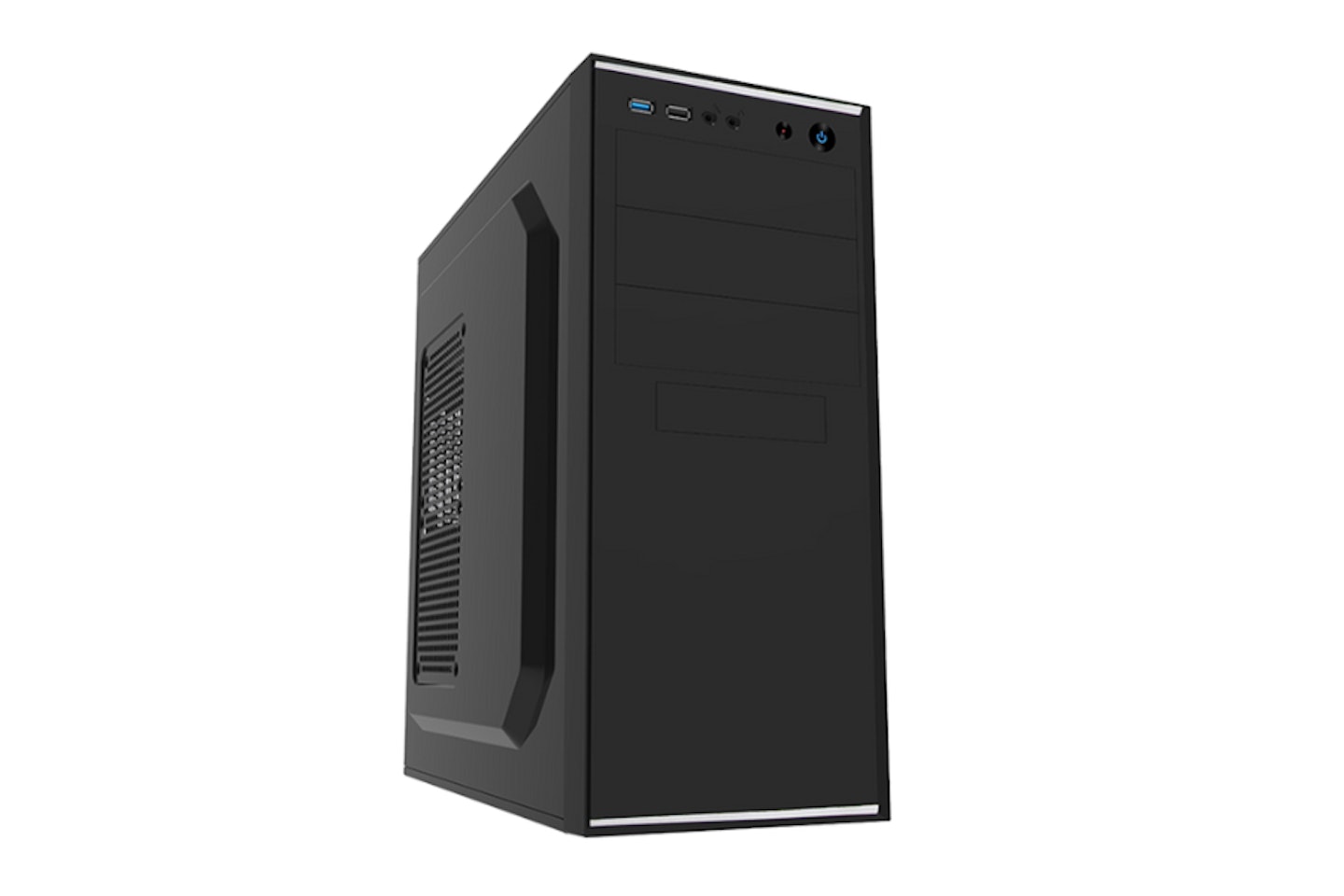
www.meshcomputers.com
If you're thinking of your next PC purchase as a budget starting block for a much better system in future, this Matrix 7 option from Mesh is ideal. Despite thinking of this as a blank canvas for eventual upgrades, it is a very capable machine right out of the box. For starters, the CPU is an AMD Ryzen 5 7600 - not the fastest, but a good mid-budget option. Next is the 8GB of RAM - you can set your sights on 16GB or 32GB expansion eventually.
In terms of storage, the 250GB M.2 SSD is enough for the Operating System and some applications - but that SSD would be the perfect first choice for an easy upgrade at some point. Again, inviting an upgrade is the Integrated AMD Radeon graphics card. With plenty of space and enough ports on the motherboard, this is a great PC for anyone who wants something with room for later enhancements. Even better, if you like the starting point that this PC gives you but don't want to do the job yourself, you can use the Mesh website to customise the spec - from RAM and power supply to sound cards and peripherals.
Pros
- Large tower case with plenty of slots
- Despite being upgradeable, good spec out of the box
Cons
- The slightly plain case aesthetic may not appeal to all (but you can customise this, too)
| CPU | AMD Ryzen 5 7600 6Core 12Threads 3.8GHz |
| GPU | Integrated RADEON RX VEGA |
| RAM | 8GB |
| Storage | 256GB HDD |
| Dimensions | 198mm x 418mm x 415mm |
| Weight | Not specified |
- Customer review: "The PC was delivered when promised and started on the button and is very quick, thanks."
Best budget PC system bundle
Vibox is a leader in providing solid gaming PC bundles, and this one really does hit the mark. First, let's see what the bundle gives you. A 24" 1080p monitor, a gaming keyboard with RGB lighting, a matching mouse, a mouse mat and even a gamer headset with a mic. Now, don't expect these peripherals to be perfect alternatives to those from brands like Razer or Corsair - they'll be serviceable budget items that do the job. But, if you're on a budget and need a gaming rig that gives you a whole system in one go, you can't go far wrong. Plus, you can then upgrade at your leisure.
As for the all-important machine itself - this is absolutely where the money has been well spent. The graphics card is an Nvidia RTX 3060 with 1 massive 12GB of onboard RAM. And then there's the 16GB of actual system RAM and a 1TB SSD for your data. It's a bit of a hidden over-specced gem for the price. Don't miss this one if you're looking for a respectable gaming rig for less.
Pros
- Unbeatable value as a one-stop-shop complete gaming PC solution
- Brilliant base spec with an RTX 3060 GPU and 16GB of RAM - ideal for modern games
- Modern gamer-friendly case design will fit in your game room perfectly
Cons
- Peripherals are basic - you'll want to replace the keyboard and mouse at some point
| CPU | Intel Core i5-10400F |
| GPU | NVIDIA RTX 3050 8 GB |
| RAM | 16 GB DDR4 |
| Storage | 500 GB SSD |
| Dimensions | 41.6 x 21.7 x 36.2 cm |
| Weight | 12.41 Kg |
- Customer review: " This PC runs smoothly, it's everything someone would need. I highly recommend Vibox. It's a beast. A cracking pc very good value for money"
Best budget all-in-one PC
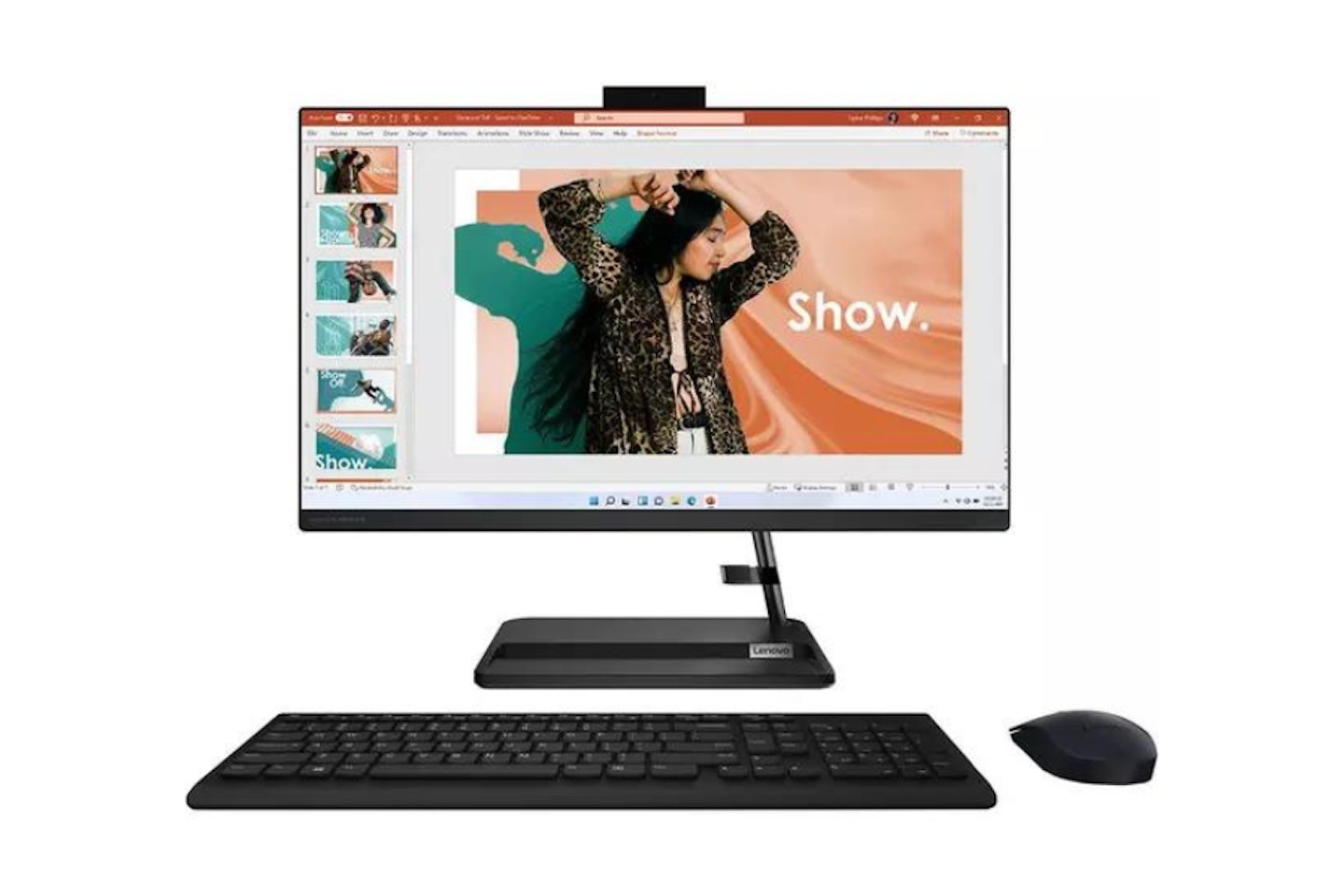
www.currys.co.uk
This all-in-one PC is a more powerful option compared to many others for the price. With a neat and formal design, this Lenovo IdeaCentre AIO leaves plenty of desk space. We particularly like how well-apportioned this is for connectivity - there's no shortage of USB ports for peripherals.
The whole thing is powered by the 13th-generation i5 CPU with 8 cores and up to 4.6GHz clock speed - so, if a multitasker, this PC will let you work at your own pace. When it comes to RAM, the IdeaCentre AIO 3i is reasonable at 8GB, too. The Lenovo IdeaCentre AIO 3i is a solid choice for a powerful all-in-one PC on a budget and makes an excellent PC for working from home.
Pros
- Excellent CPU for an all-in-one PC - and the right amount of RAM for everyday computer tasks
- Well-designed and manufactured - it's a solid build throughout
- A sensible amount of SSD storage for your applications and fast loading times
Cons
- Don't expect to do heavier tasks like AAA gaming at top settings or professional computer-aided design
| CPU | i5-13420H |
| GPU | Intel UHD graphics |
| RAM | 8GB |
| Storage | 512GB |
| Dimensions | 434 x 541.2 x 185.3 mm |
| Weight | 7.03 kg |
- Customer review: "I have been using my new Lenovo for a month and am really happy with it. It is fast, easy to use and has so many great features. Very stylish design too."
Best budget PCs of 2025: Buyer's guide
What kind of PC user are you?
When choosing your next PC on a budget, the single most important decision you'll make is to carefully identify your needs. Budget PCs are, by definition, going to be less capable than machines costing a lot more. That also means you'll have less wriggle room when it comes to pushing its limits when you try to run various applications.
So, getting this right early on is essential. Everyone's use case is bespoke to their needs, but here are some general pointers for which specifications to look after depending on what kind of user you are.
Office work
If you need to run several office applications at once, look at the CPU, RAM and budget for a good-quality ergonomic keyboard and mouse. Graphics capabilities will probably be lower down on your list, but make sure you have at least two HDMI ports for connecting to more than one modern monitor - this is especially important if you are multitasking.
Gaming
Gamers are the hardest users to cater for with even the best budget gaming PCs. Yes, you'll need as much RAM as you can afford, but you'll also need an SSD for fast and sizable storage capacity. Your first step is to look up the recommended system requirements of your favourite games. Then, compare these to the budget PC you're looking at. By far, the most important component is your graphics card. Always go for a dedicated card and avoid integrated ones (the ones that are a part of the motherboard). Even with a middling amount of RAM and CPU power, doing this will ensure much better performance.
Casual browsing
As with the office work category, the casual PC user will need to do a little of everything. You'll probably need a lot less graphics power for light gaming than a serious game fan would, but more than an office worker will need. 4GB of RAM and a 500GB hard drive with a modern mid-range processor is a good balance.
Design and creative media
Those who enjoy digital art, creativity and all kinds of visual media have needs that are a mix of the above, with an emphasis on graphics capability, while also thinking about RAM, and the CPU. Graphics, and particularly video work, will require a really fast CPU. Even maxing out your RAM won't help if your processor can't keep up.
Upgrades and expandability
Don't forget that one of the benefits of going for a full-size PC over a laptop is that you can upgrade and expand the capabilities of a budget PC with ease. And that means you can spend less on the best budget PC you can afford, knowing you can add more later. Here are some of the easily expandable components.
Storage
You can add more storage to the computer in two ways. By far, the easiest is to buy a portable external hard disk drive that will simply plug into a USB port on the computer. To support the highest speed available, you should look for the blue colour-coded USB-3 port on your PC. HDD and SSD external disk drives are available, with the former being cheaper and with larger capacities than the smaller but faster Solid State Drives.
If you're technically savvy, it's often possible to add a second or third internal hard drive too - but if you're planning to do this, check that the motherboard in the PC can support it.
RAM
Probably sounding much more difficult than it is, it's quite simple to open the side panel of your PC (with the power off and disconnected) and insert more RAM into an adjacent slot on the motherboard. You will, however, need to make sure you're properly earthed (using a simple anti-static wrist strap) before touching the machine to avoid electrostatic damage.
RAM - the working memory of your budget PC - normally comes in the form of chips on small stick-like circuit boards. As long as your budget PC has a spare slot and you match the memory type to that supported by the board, you can upgrade your machine in seconds. You could even buy all-new RAM and swap out the existing ones as long as the new RAM is supported.
Graphics card
Much like the RAM above, if the best budget PC you can afford only comes with onboard / integrated graphics, you can upgrade easily. Identifying the type of available expansion slots in the motherboard is key. As long as the graphics card, like those made by Nvidia and ATI, will fit on the board and is a good match for your CPU and RAM, you can slot one of these into your PC in a couple of minutes. Once again, you should have all the power disconnected and make sure you're earthed.
Looking for a laptop instead? Although they're technically a 'PC', we've covered those separately in our guide to the best budget laptops.
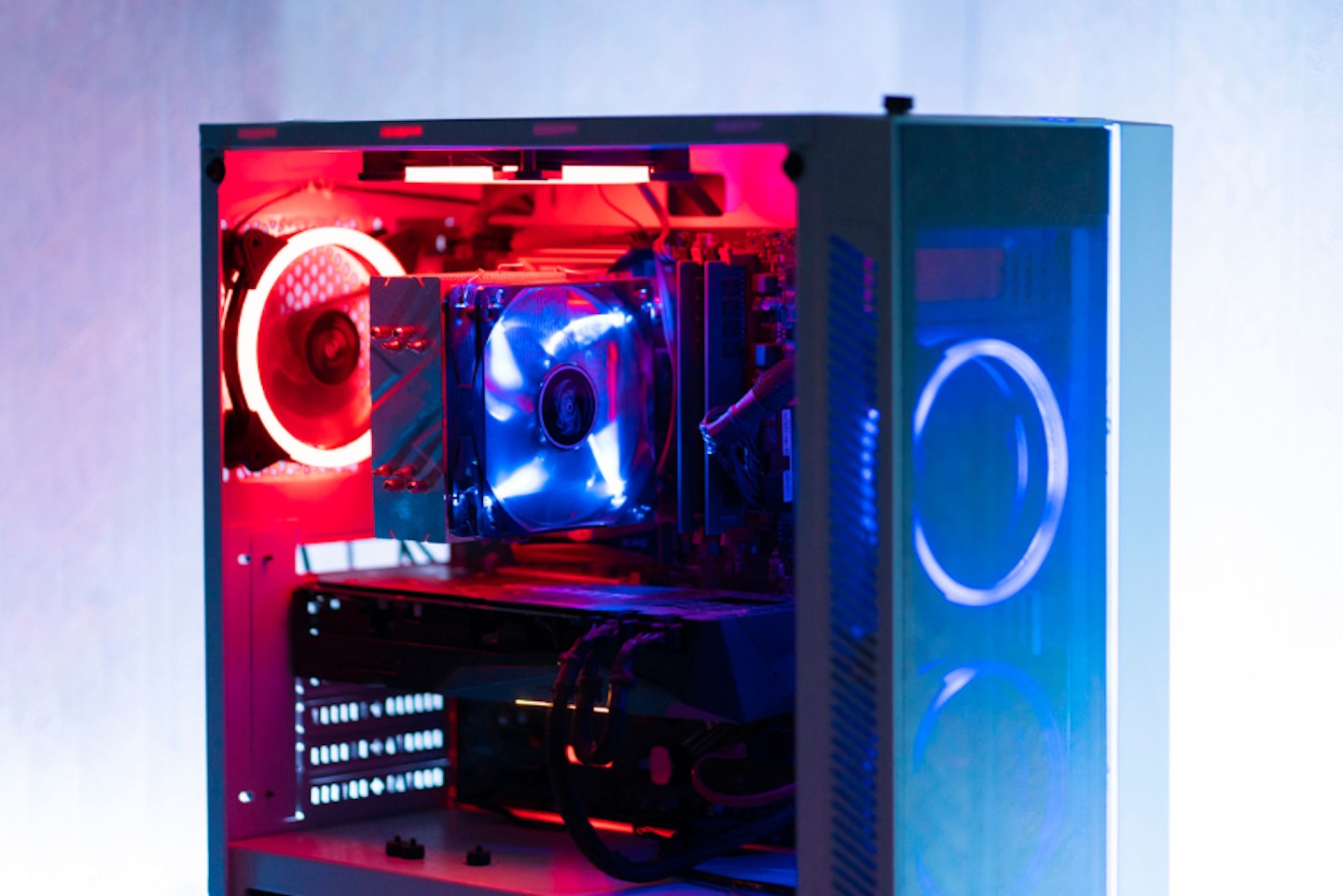
Best budget PCs of 2025: Top tips
Beware the bling
Many budget PCs pitch themselves very well by using overly designed cases with lots of unnecessary shapes, angles and - well - bling. RGB lighting is a cheap and effective way of making a cheap and nasty PC look far more impressive at first glance. We recommend you look straight past the photos and go straight to the hardware and software specifications.
Budget for better peripherals
Sometimes, the best budget PCs will look to compete in the marketplace by throwing in extras like keyboards, speakers, a mouse and monitors. Some of the time, these are basic but acceptable, but much of the time, they're poorly made, unbranded tat. Unless they're from recognisable brands with good reviews, we strongly recommend ditching them in favour of buying your own. This is particularly true when it comes to budget PCs bundled with mouse and keyboard - often, again, RGB lighting is used to make them look much better than they are.
Consider a VPN
Of course, your budget PC will connect to the internet - and that comes with some risks. Antivirus is great, of course, and you should definitely invest in security suite software such as Bitdefender or McAfee to protect you from the worst. However, what about your personal data? A VPN (Virtual Private Network) is a secure tunnel to the internet that hides your IP address from would-be hackers and snoopers. If privacy is your priority, we highly recommend an affordable VPN for that extra layer of security.
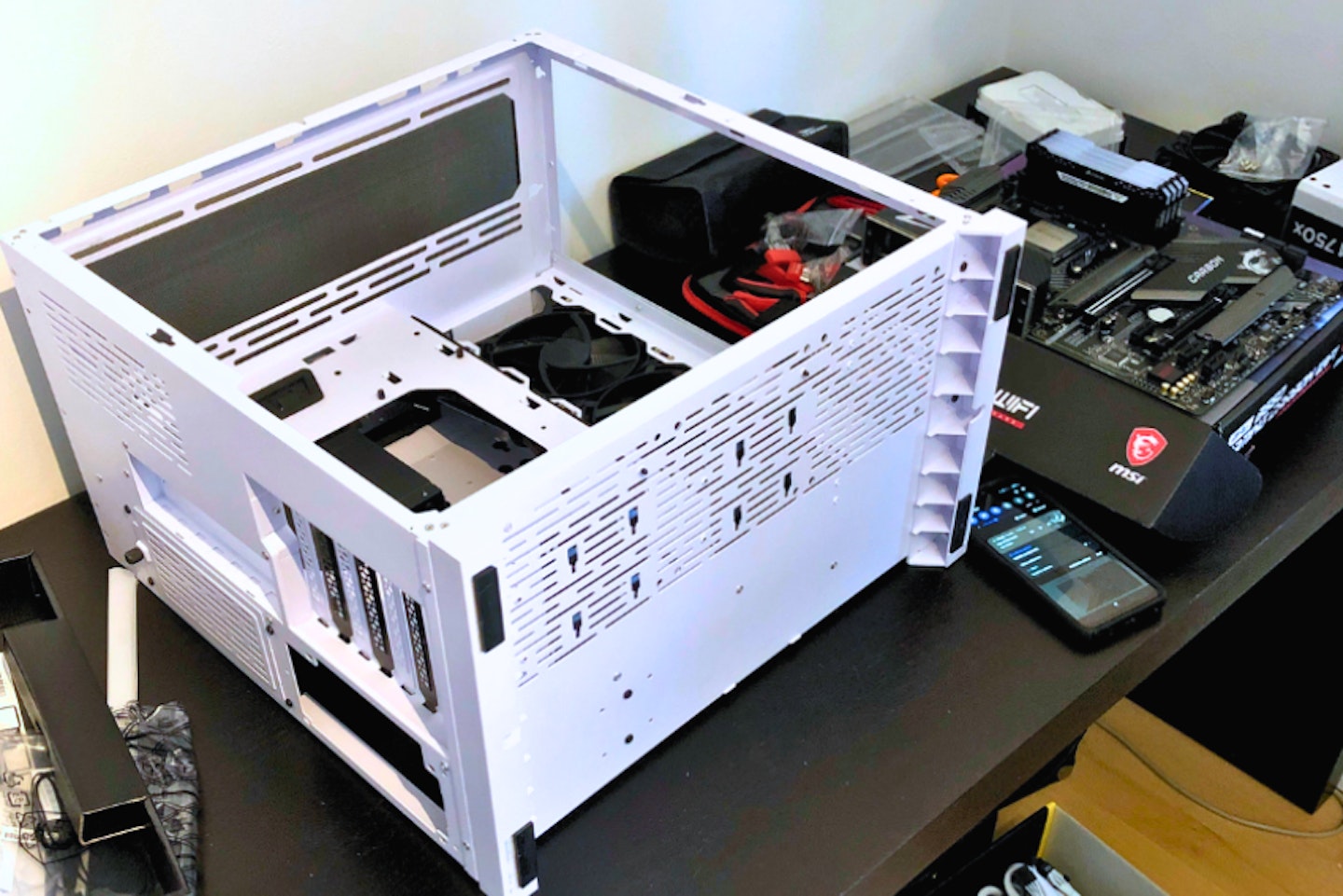
Frequently asked questions
Are budget PCs worth it?
As always, this comes down to how much cash you have to spare. For some, a budget PC might cost less than £1000 - especially compared to some high-end beasts out there. For others, budget may mean anything less than £400.
Whatever you spend, whether it's worth it or not, is down to what you are looking to achieve with your new machine. Even the best budget PC will be a poor buy if you haven't looked after the specifications first. If you follow the advice in our buyer's guide, every budget PC is potentially a great choice.
What are the best budget PCs for gaming?
As we mentioned in our line-up, the ADMI Gaming PC Ryzen 5500 is an excellent choice for budget gaming. Budget PCs are rarely the first choice for serious gamers due to limited graphics cards, CPU and RAM. But, it is possible to get a really capable budget gaming PC that can run many of the latest games, all be it at reduced framerates and resolutions than that of PCs costing three times as much.
Can I build a PC on a budget instead?
It's completely possible to build your own PC - providing you have the know-how. Those who embark on this task will undoubtedly save money. Parts for your build, checked for compatibility with the rest of your components, can often be bought from websites like PCPartPicker.
However, this is not recommended for newcomers. By far, the fastest and easiest way to get yourself the best budget PC is to buy one pre-built for just a little more cash.
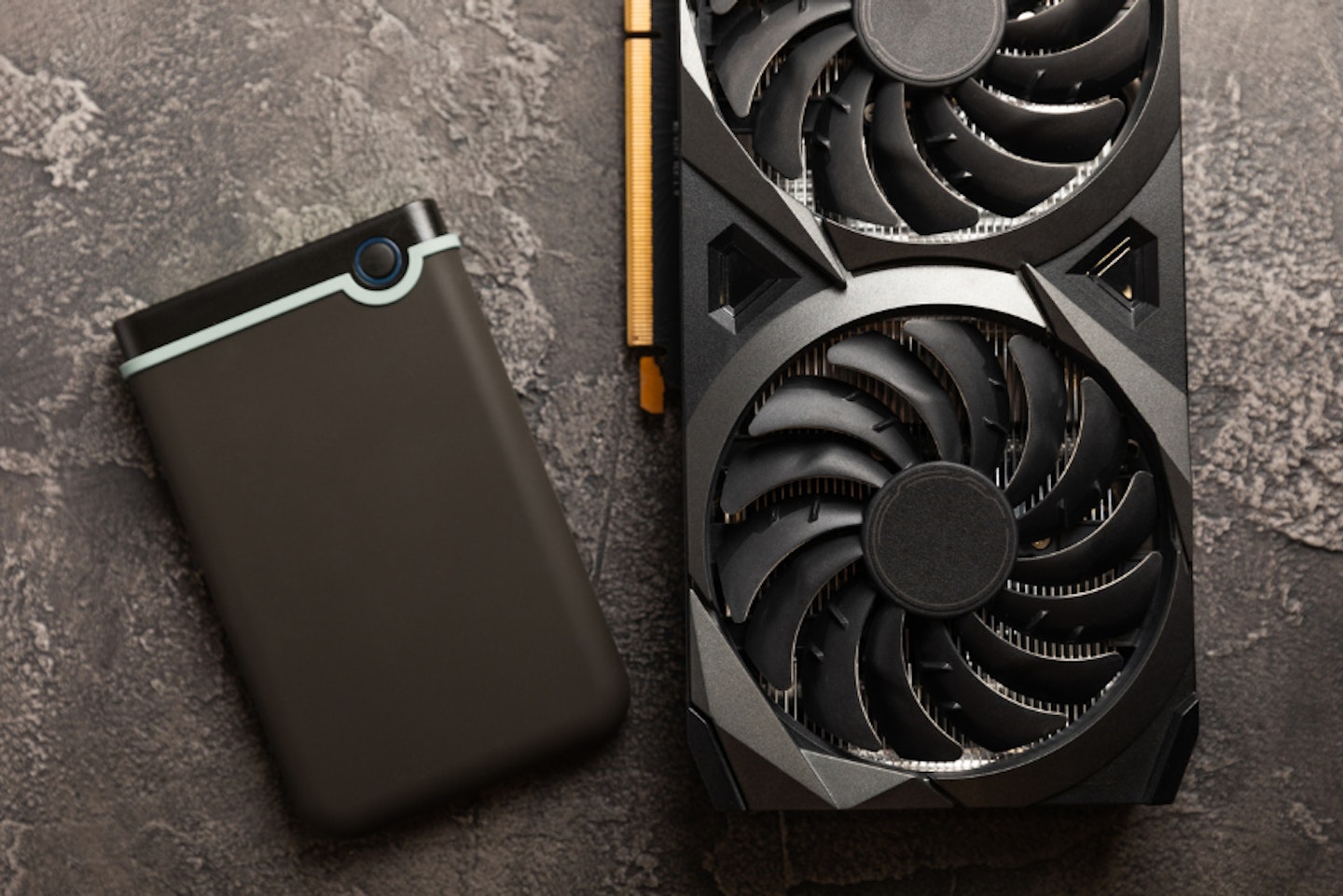
Best budget PCs: Jargon buster
CPU
A Central Processing Unit, or CPU, processes and executes instructions. Think of this as the brain of the PC. Processors often consist of multiple cores. A higher number of cores increases the amount and intensity of tasks that the CPU is able to carry out.
GPU
A Graphics Processing Unit. Otherwise known as a graphics card. They generate an output feed to a monitor. Every computer has at least a basic one - usually referred to as an integrated graphics card, as it is part of the main motherboard. Dedicated graphics cards have additional processing to improve performance. These cards have dedicated video RAM processor(s), fans and heat-syncing solutions.
RAM
Random Access Memory, or RAM, is a component that temporarily holds information for quick access by the CPU. The information will be related to programs and services that are in use. The more RAM available, the more quick-access information there is available to the CPU, thereby improving computer performance.
HDD
An HDD or hard disk drive is the storage on the computer. It writes and retrieves data to a disk using magnetic storage.
SSD
An SSD or solid-state drive is another option for storage. Unlike its counterpart, an SSD has no moving parts. Much like an SD card, they use flash memory to store and retrieve data. Effectively, they are faster hard drives that will transfer, load and store data faster. They are also more reliable too.
Keep in mind that an SSD will offer less storage and cost more than an HDD. Some computers come with both, often opting to install the operating software on it for a faster boot-up time. If you choose an SSD, you may want to consider having some additional storage as sizes are typically smaller.
eMMC
Embedded MultiMediaCards, or eMMCs, are not too different from SD cards or SSDs. They are not as fast as SSDs and are typically soldered to a PC's motherboard. They will get the job done but are slower. They typically come in lower-end budget PCs, usually in laptops, as they have limited space inside.
Chris Duffill is a Tech Product Writer for What's The Best and Yours. His background includes writing, editorial, marketing, design, video production and photography.
He specialises in home entertainment and audiovisual tech, including speakers, amplifiers, turntables, streaming media players, and TVs. He is also one of our resident experts in computing (PCs, tablets, smartphones, smartwatches), DSLR photography and all kinds of digital cameras. He also writes about retro gaming, game consoles and various electronic gadgets. If it plugs in, lights up or makes a noise, he’ll write about it.
Subscribe to the What's The Best Newsletter to keep up to date with more of the latest reviews and recommendations from the rest of the What's The Best team.
